
Jagannatha is a deity worshipped in regional Hindu traditions in India as part of a triad along with his (Krishna's) brother Balabhadra, and sister, Subhadra. Jagannath, within Odia Hinduism, is the supreme god, Purushottama, and the Para Brahman. To most Vaishnava Hindus, particularly the Krishnaites, Jagannath is an abstract representation of Krishna, sometimes as the avatar of Vishnu. To some Shaiva and Shakta Hindus, he is a symmetry-filled tantric form of Bhairava, a fierce manifestation of Shiva associated with annihilation.
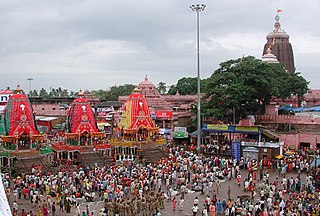
The Ratha Yatraof Puri, also rendered as the Ratha Jatra, is considered the oldest and largest Hindu chariot festival celebrated annually, on the bright half of the lunar month of Ashadh (June–July). The festival is held at the city of Puri, in the state of Odisha, India and associated with the deity Jagannath. During the festival, three deities are drawn by a multitude of devotees in three massive, wooden chariots on bada danda to Gundicha Temple whereby they reside there for a week and then return to the Jagnannath temple. This return trip is referred to as the Bahuda Yatra.

Puri is a coastal city and a municipality in the state of Odisha in eastern India. It is the district headquarters of Puri district and is situated on the Bay of Bengal, 60 kilometres (37 mi) south of the state capital of Bhubaneswar. It is home to the 12th-century Jagannath Temple and is one of the original Char Dham pilgrimage sites for Hindus.

The Jagannath Temple is a Hindu temple dedicated to the god Jagannath, a form of Vishnu in Hinduism. It is located in Puri in the state of Odisha, situated on the eastern coast of India. As per temple records, King Indradyumna of Avanti built the main temple of Jagannath at Puri. The present temple was rebuilt from the tenth century onwards, on the site of the pre-existing temples in the compound, but not the main Jagannath temple, and begun by Anantavarman Chodaganga, the first king of the Eastern Ganga dynasty. Many of the temple rituals are based on Oddiyana Tantras which are the refined versions of Mahayana Tantras as well as Shabari Tantras which are evolved from Tantric Buddhism and tribal beliefs respectively. The local legends link the idols with aboriginal tribes and the daitapatis (servitors) claim to be descendants of the aboriginals. The temple is one of the 108 Abhimana Kshethram of the Vaishnavite tradition.

Yatra, in Indian-origin religions, Hinduism, Buddhism, Jainism and Sikhism, generally means a pilgrimage to holy places such as confluences of sacred rivers, sacred mountains, places associated with Hindu epics such as the Mahabharata and Ramayana, and other sacred pilgrimage sites. Visiting a sacred place is believed by the pilgrim to purify the self and bring one closer to the divine. The journey itself is as important as the destination, and the hardships of travel serve as an act of devotion in themselves.
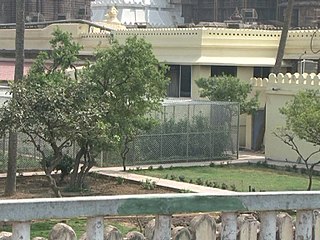
Nabakalebara also spelled as Navakalevara is the ritualistic recreation of the wooden icons of four Hindu deities at Jagannath Temple, Puri. The ritual is performed during the 8th, 12th, or 19th year after the previous Nabakalebara.

The Snana Yatra, also spelt Snana Jatra, is a bathing festival of deities celebrated on the purnima of the Hindu month of Jyeshtha. It is the auspicious birthday of Jagannath.

Gundicha Temple, is a Hindu temple, situated in the temple town of Puri in the state of Odisha, India. It is significant for being the destination of the celebrated annual Rath Yatra of Puri. While it remains vacant most of the year, the temple is occupied by images of the deities of Jagannath, his brother Balabhadra and sister Subhadra for seven complete days every year during the annual Rath Yatra festival.

The Char Dham, also rendered the Chatur Dhama is a set of four Hindu pilgrimage sites in India, consisting of Badrinath, Dwarka, Puri and Rameswaram. Badrinath, Dwarka, and Puri are shrines of Vishnu, whereas Rameswaram is a shrine of Shiva.
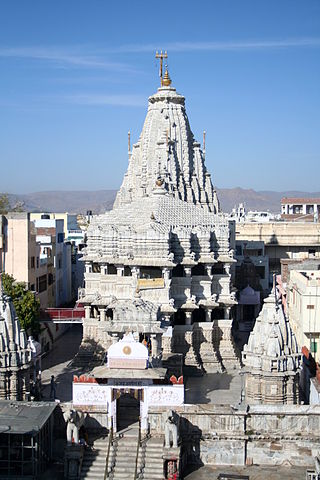
Jagdish Temple is a large Hindu temple in the middle of Udaipur in Rajasthan, just outside the royal palace. It has been in continuous worship since 1651. A big tourist attraction, the temple was originally called the temple of Jagannath Rai but is now called Jagdish-ji. It is a major monument in Udaipur.

The Jagannath Temple in Hyderabad, India,Telangana, is a modern temple built by the Odia community of the city of Hyderabad dedicated to the Hindu God Jagannath. The temple located near Banjara hills Road no.12 (twelve) in Hyderabad is famous for its annual Rathyatra festival attended by thousands of devotees. Jagannath means Lord of the Universe. The temple which was constructed during 2009 recently lies in Center of Hyderabad City.

Jagannath Temple is a Hindu temple dedicated to Lord Vishnu and located in Alwar, India. The temple's presiding deity is anthropomorphic form of Lord Jagannath of Puri, while other two deities are SitaramJi, the Shaligram maharaj and JankiJi, the goddess Laxmi. The temple is built several meters above the ground in old part of the city. It has awe inspiring medieval architecture and rare floral motifs adorn its walls and pillars. The Garbhagriha has two deities of Lord Jagannath, one is movable while other is fixed. It is probably the only temple where two deities of one presiding Lord reside simultaneously. The temple is famous for its annual Rath Yatra festival where Lord Jagannath is carried in a chariot called Indra Vimana. The chariot, earlier an elephant carriage, had been used by erstwhile Maharaja of Alwar and was donated to the temple later on to be used for the Rath yatra. The Rath Yatra festival follows different traditions and rituals than those of Puri. Here, it is part of annual wedding celebration between Lord Jagannath and JankiJi at Roopbas. The fixed deity of Lord Jagannath, Budhe Jagannath, is much older and available for darshana only for five days during Rath Yatra.

Shri Shri Hari Baladev Jew Bije is a famous Hindu temple located in Baripada, Mayurbhanj district, in the state of Odisha, India. The name Jagannath is a combination of the Sanskrit words Jagat (Universe) and Nath.

ISKCON Temple Chennai, also known as the Sri Sri Radha Krishna Mandir, is a Gaudiya Vaishnavism temple in Chennai, India. The temple is dedicated to Supreme Lord Krishna and His divine consort Radha. It was formally inaugurated on 26 April 2012.

Ratha Yatra, or chariot festival, is any public procession in a chariot. They are held annually during festivals in India, Nepal and Sri Lanka. The term also refers to the popular annual Ratha Yatra of Puri. that involve a public procession with a chariot with deities Jagannath, Balabhadra, Subhadra and Sudarshana Chakra on a ratha, a wooden deula-shaped chariot.
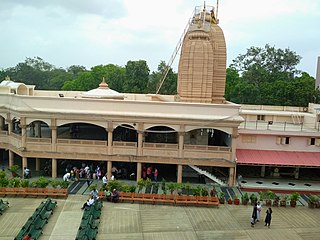
The Jagannath Temple is a temple dedicated to the Hindu God Jagannath in the city of Ahmedabad in the Gujarat state of India. The temple is famous for its annual chariot festival, the Rath Yatra, which is the third most important and largest after the Ratha Yatra at Puri. The temple remains open for devotees from 04:30 AM to 01:00 PM and 03:00 PM to 09:00 PM daily.
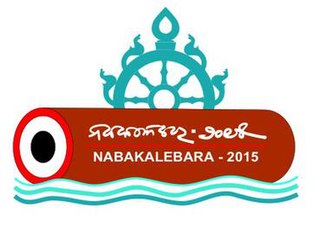
The Nabakalebara 2015 is a celebration of the ancient ritual of the Nabakalebara associated with most of the Jagannath Temples when the idols of Lord Jagannath, Balabhadra, Subhadra and Sudarshan are replaced by a new set of idols; the last such festival of events was held in 1996. The period of the festival is chosen according to the Hindu Calendar, conforming to the astrological planetary positions. The festival during 2015 involves several schedules, and it has started from 23 March with Banajaga Yatra and will conclude with Rathayatra followed Sunabesa on 27 July, with many other rituals being held in between on specific dates. More than 5 million devotees are expected to participate in these rituals held in and around the temple complex of the Jagannath Temple, Puri, Odisha.

Suna Besha, also known as Rajadhiraja beshaRaja Besha and Rajarajeshwara Besha, is an event when the Hindu deities Jagannath, Balabhadra and Subhadra are adorned with gold jewelry. Suna Bhesha is observed 5 times during a year. It is commonly observed on [pousha purnima ] Purnima (January), Bahuda Ekadashi (July), Dashahara (October), Kartik Purnima (November), and Dola Purnima (march). The name Suna Bhesha is derived from two words, 'Suna' meaning "gold" and 'Bhesha' meaning "costume".

Rath Yatra is a Hindu festival celebrated annually in Ahmedabad. Since 1878, the Jagannath Temple, Ahmedabad has organized the Rath Yatra procession on Asadh Sud Bij. This festival celebrates the deities Jagannath, Balrama and Subhdra.























